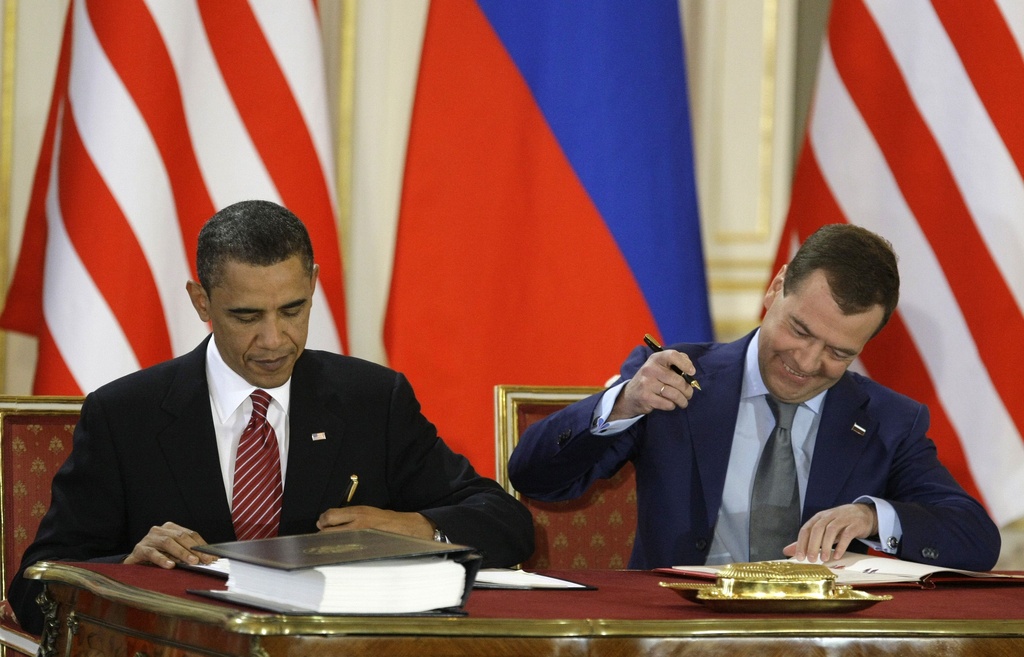
Start II seen as step forward in arms control

The new Start agreement on limiting nuclear weapons signed in Prague by the United States and Russia has been welcomed by the Friday editions of Swiss newspapers.
But although editorialists consider the accord an important signal for progress on the nuclear issue, they also point out that there is still much work to be done.
The pact is set to reduce the nuclear warheads limit to 1,550 per country over seven years after coming into force.
The Basler Zeitung describes Start II, signed by Presidents Barack Obama and Dimitri Medvedev in the Czech capital, as the “most comprehensive disarmament accord signed in 20 years”.
“Barack Obama’s vision of a nuclear-free world has come a little closer… The signatures also represent for Obama the first real foreign policy success.”
The paper comments that Obama knows he needs Moscow’s support against the spread of nuclear weapons, particularly in the United Nations Security Council where it wants sanctions against Iran for its uranium enrichment programme.
“That fits well with Russia’s thinking. With the new disarmament treaty, it considers itself once again on the same level as the US.”
Undeniable success
Le Temps comments that this “new chapter” between Washington and Moscow is an undeniable diplomatic success.
“Announced as a priority by Barack Obama when he entered office in January 2009, the new Start treaty fills a dangerous legal hole.” This was left with the expiry of the previous accord last December.
But the paper points out that the accord leaves out the issue of short-range tactical nuclear weapons that will be the subject of negotiations for a separate agreement.
The Tribune de Genève says the Prague signing ceremony is less important than the way it opens for the future.
The paper says the agreement is “the promise of a vital understanding between the United States and Russia”. It might not involve the European countries, but it’s for their good, it comments.
Most important threats
It also says the most important threats on the nuclear issue today are from Iran and North Korea.
On relations with Tehran, Zurich’s Neue Zürcher Zeitung feels that both presidents signalled they were prepared to cooperate and listen to each other over Iran.
The paper believes Medvedev is looking for stronger economic ties with Washington.
The editorial in Zurich’s Tages-Anzeiger, which also appears in the Bund newspaper of Bern, doesn’t mince its words.
“US President Obama is no saint,” it comments. It says Obama did not only sign the accord because he feels a duty towards promoting peace, but also because he wants to make his country a safer place.
US military strength
“It’s a fact that the military power of the US is strengthened with every nuclear weapon that’s scrapped.”
This is a reference to US conventional weapons which far exceed those of all possible opponents.
The paper also points out a fundamental difference in attitude between Obama and his predecessor at the White House, George W. Bush.
“Unlike his predecessor, who ignored international treaties, Obama has recognised that he can only guarantee America’s security with the help of others.”
“The new disarmament treaty is a first step, even though as before there are still thousands of warheads [in place] that are ready and waiting.”
Robert Brookes, swissinfo.ch
The Strategic Arms Reduction Treaty was a bilateral treaty between the United States and the Soviet Union on the reduction and limitation of strategic offensive arms.
The treaty was signed on July 31, 1991 and entered into force on December 5, 1994.
The treaty barred the signatories from deploying more than 6,000 nuclear warheads on top of a total of 1,600 inter-continental ballistic missiles, submarine-launched ballistic missiles, and bombers.
Start negotiated the largest and most complex arms control treaty in history, and its final implementation in late 2001 resulted in the removal of about 80 per cent of all strategic nuclear weapons then in existence.
Proposed by US President Ronald Reagan, it was renamed Start I after negotiations began on the second Start treaty, which became Start II.
The Start I treaty expired on December 5, 2009.
The new Start treaty signed in Prague will enter into force after its ratification through the parliaments of both countries.
The new pact will shrink the limit of nuclear warheads to 1,550 per country over seven years after coming into force. That still allows for mutual destruction several times over.
It is aimed at sending a strong signal that Russia and the US, which between them own more than 90 per cent of the world’s nuclear weapons, are serious about disarmament.
Obama and Medvedev reaffirmed their commitment to considering new sanctions against Iran if the Islamic republic continues to refuse to suspend uranium enrichment and start talks on its nuclear programme.
Medvedev said it was regrettable that Iran had not responded to many constructive proposals the international community had offered, and it was possible the United Nations Security Council would have to take up the issue.
Obama said the US would not tolerate any actions by Iran that risked an arms race in the Middle East or threatened the credibility of the international community.

In compliance with the JTI standards
More: SWI swissinfo.ch certified by the Journalism Trust Initiative



























You can find an overview of ongoing debates with our journalists here . Please join us!
If you want to start a conversation about a topic raised in this article or want to report factual errors, email us at english@swissinfo.ch.